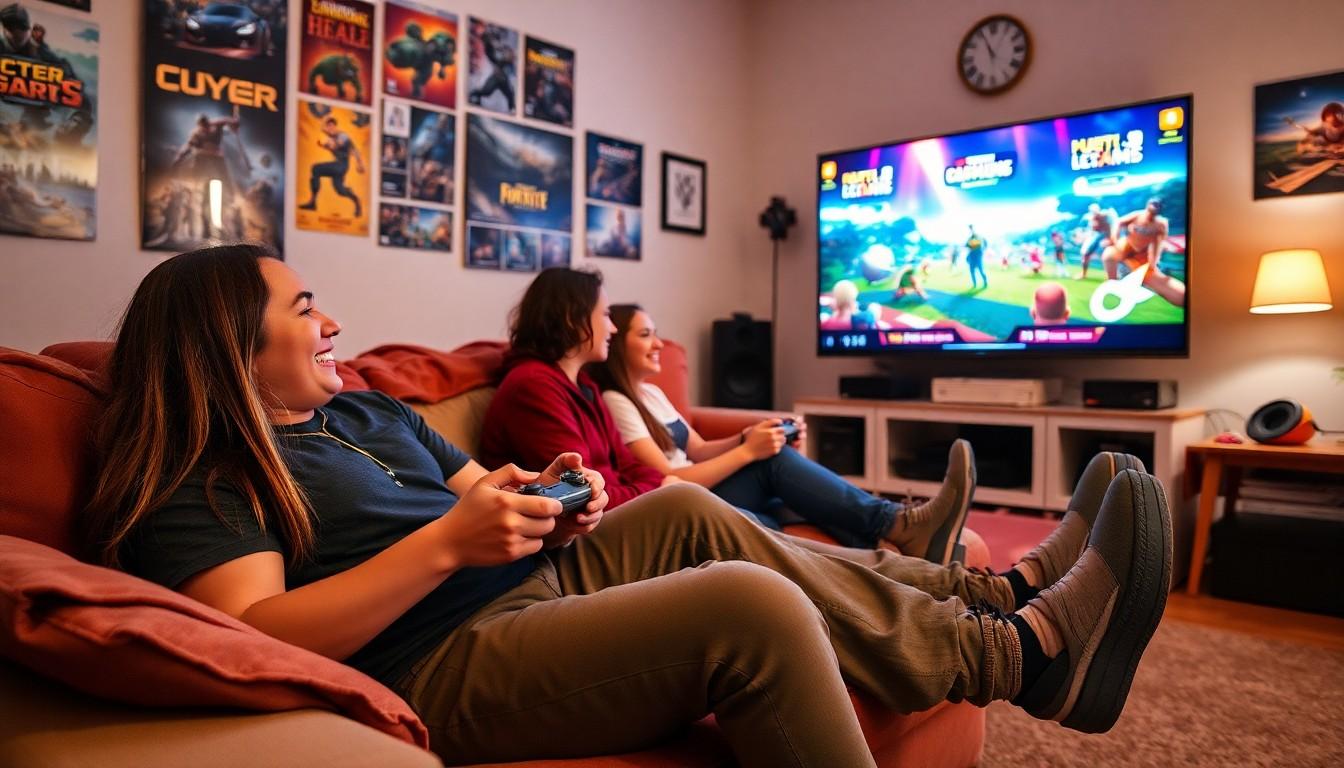In the vibrant world of gaming, two distinct tribes emerge: casual gamers and professional gamers. While both wield controllers and navigate pixelated landscapes, their motivations and experiences couldn’t be more different. Casual gamers dive into their favorite titles for a bit of fun and relaxation, often treating gaming like a delightful snack break. On the flip side, professional gamers approach it like a high-stakes job, complete with training regimens and strategies that would make even the most seasoned athletes raise an eyebrow.
Understanding Casual Gamers
Casual gamers engage with video games primarily for enjoyment and relaxation. These individuals play games in their free time without the pressures associated with competition or high performance.
Definition of Casual Gamers
Casual gamers represent a broad category of players who enjoy gaming at a relaxed pace. Typically, they favor accessible games that require less investment in time and effort. Casual gamers often seek entertainment rather than mastery and may play just for a few minutes or hours each week. This group’s preferences range from mobile games to social gaming experiences that enhance interaction rather than competition.
Characteristics of Casual Gamers
Casual gamers exhibit several defining traits. First, they prioritize enjoyment over competition. Most players favor titles that allow them to unwind without extensive prior knowledge. Many engage with gaming on multiple platforms, including mobile devices, consoles, and computers. Short gaming sessions characterize their habits, where quick satisfaction takes precedence. Social interaction is also significant, as they often play with friends or family rather than alone. Overall, casual gamers embrace gaming as a fun, stress-relieving hobby rather than a serious commitment.
Exploring Professional Gamers

Professional gamers represent a distinct group within the gaming community. Their approach to gaming focuses on competition, encompassing training, strategy, and performance.
Definition of Professional Gamers
Professional gamers engage in competitive gaming at an advanced level. These individuals participate in tournaments or leagues where they compete for cash prizes and sponsorships. Extensive skill development is crucial for them, reflecting their commitment to gaming as a career choice. Unlike casual gamers, professional gamers often specialize in specific genres or titles. Their dedication sets them apart, as gaming becomes not just a hobby but a primary source of income.
Characteristics of Professional Gamers
Professional gamers exhibit several key characteristics that differentiate them from amateurs. They dedicate significant hours to practice and refining their skills, often following strict training regimens. Competitions frequently demand teamwork, meaning they develop strong communication and collaborative abilities. Access to coaching and resources enhances their gameplay, and many leverage analytics to improve performance. Notably, professional gamers maintain a strong online presence, participating in streaming and social media to engage with fans and build their brands.
Key Differences Between Casual and Professional Gamers
Casual gamers and professional gamers exhibit distinct differences in several key areas. These differences highlight how each group approaches gaming in unique ways.
Gaming Motivation
Casual gamers seek entertainment and relaxation. They enjoy exploring various games that provide fun experiences without stress. Social interaction plays a vital role, as they often play with friends or family. In contrast, professional gamers thrive on competition and strive for excellence. Earning cash prizes and recognition drives their dedication. Passion fuels their ambition, pushing them to achieve higher ranks in the gaming community.
Time Commitment
Casual gamers typically engage in gaming during short, flexible sessions. Their playing time may range from a few minutes to a couple of hours, depending on their daily schedule. Often, they prioritize gaming around other responsibilities, choosing to play as a break from daily life. Professional gamers dedicate extensive hours to practice, often exceeding 40 hours a week. Focused training sessions aim to refine specific skills and strategies. Time management becomes essential for them, allowing for both practice and recovery.
Skill Level
Skill levels among casual gamers vary but often remain basic or intermediate. These players may enjoy learning new skills but do not focus on achieving high proficiency in gameplay. Casual gamers embrace the fun and simple aspects of games. Conversely, professional gamers possess advanced skills and deep knowledge in specific genres. They consistently analyze gameplay and adapt strategies to enhance performance. Competitive play demands mastery, requiring them to stay updated with evolving game mechanics and tactics.
Impact on Gaming Communities
Casual and professional gamers shape their respective communities distinctly. Casual gamer communities thrive on social interaction and shared experiences.
Casual Gamer Communities
Casual gamers often gather in online forums and social media platforms. They share tips, experiences, and game recommendations, fostering a friendly atmosphere. Events like local game nights and family gaming sessions further strengthen these connections. Accessibility remains a priority, allowing players of all skill levels to join in. Encouragement and support are foundational elements, driving inclusive dialogues. Strong bonds form through cooperative gameplay, resulting in lifelong friendships.
Professional Gamer Communities
Professional gamer communities revolve around competition and skill development. Intense rivalries and partnerships create a vibrant dynamic among players. Training regimens are meticulously shared, enabling growth among all members. Tournaments and leagues serve as key events, drawing large audiences and sponsorship. Achievements and accolades establish a player’s status within the community, promoting a culture of excellence. Networking opportunities abound, facilitating collaborations that enhance visibility and career progression.
Conclusion
The distinction between casual and professional gamers underscores the diverse landscape of gaming culture. Casual gamers prioritize enjoyment and social interaction while professional gamers pursue excellence and competition. This divergence shapes their gaming experiences and community interactions.
Casual gamers create vibrant communities centered around shared enjoyment and camaraderie. Professional gamers, on the other hand, cultivate environments focused on skill enhancement and competitive success. Understanding these differences not only enriches the appreciation of gaming but also highlights the unique contributions each group brings to the overall gaming ecosystem.

